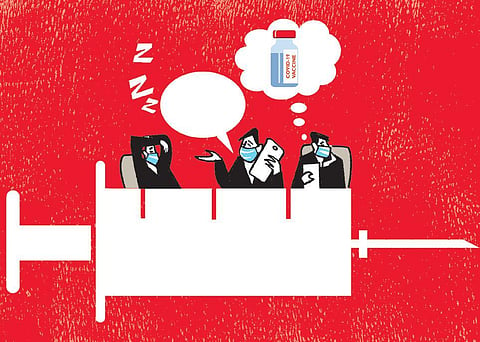

Twenty-four years ago, a poor Third World country decided to vaccinate 12.1 crores of children against polio on a single day. It was not an aspiring superpower at that time but was limping back to normalcy after tottering on the brink of a total economic collapse a few years ago. The information revolution and computers lay many years to its future.
But it decided to go ahead with this mammoth task anyway. It opened 6.5 lakh vaccination posts across the country, and 26 lakh health workers and volunteers took up the challenge. Despite all its efforts, it did not achieve the target of 12.1 crore vaccinations on December 7, 1996. It could do only 11.75 crore vaccinations that day—it was a world record. So this battered, poor country decided to repeat the exercise once again in a few weeks.
On January 18, 1997, it vaccinated another 12.73 crore children. There was no pandemic raging, crippling its economy then. It did not even have a strong leader at the helm. It was a lame-duck coalition government of HD Deve Gowda hanging with its teeth to power that presided over this mammoth achievement.
Now, India is an aspiring superpower or has pretensions of being one. We have a government with a brute majority. We boast of being an information superpower. The data of most Indians are in the Aadhar network. We have glittering malls, the world’s tallest statue, metro trains, a bullet train in the making from a megapolis to a tier II city, some fat cat billionaires and the claim of being the world’s pharma factory. However, as the pandemic is wreaking havoc, our health infrastructure remains exposed to its worth. We have built a glass skyscraper on a foundation of twigs. These things cannot be solved overnight. To get out of the mess, we need to vaccinate the maximum number of people in the shortest possible time. And that is where we are faltering.
The two steps announced by the Union government are baffling. Vaccine makers can sell half their Covid-19-related stock to states and the private sector at a price fixed by them. It is Laissez-faire capitalism at its most brutal format. At Rs 150 a jab, a vaccine maker himself admitted he was making a decent though not an obnoxious profit. Immediately after the announcement, the vaccine makers declared different prices for different entities. The Central government gets it at the lowest rate and the state governments at two-and-a-half times higher. The private providers get it at four times the Centre’s rate. All this has led to a scramble for vaccines.
When the vaccine manufacturer is flooded with purchase orders from different states or from private entities, who are willing to pay a higher price, it is anyone’s guess who they would give first preference. No state government can go and buy vaccines like tomatoes or eggs from the market. They all would have to go through the cumbersome bureaucratic hurdles to issue purchase orders. State governments are already struggling to arrange oxygen and medicines for the people. They are now expected to learn how to procure the vaccines, store them and plan the vaccination drive.
We have seen states fighting for oxygen cylinders and hoarding essential medicines etc. Now, we can see vaccine hoarding and vaccine fights soon. Already, the vaccination drives have come to a grinding halt in most states. How are the state governments, reeling under the economic fall of the past year, going to find funds to fill the Vaccine Capitalists’ overflowing coffers? By taxing the people of an impoverished country for something as basic as vaccines? How will the procurement of medical oxygen, ventilators, hospitals and medicines happen if state governments run out of funds? Most state governments neither have the leadership nor the expertise to run this initiative, even if they manage the funds.
The Union government had allocated Rs 35,000 crore for Covid-19 vaccination in the 2021-22 Budget. At Rs 150 per dose, where the vaccine maker gets a decent profit, this is more than enough to vaccinate enough people for herd immunity. Even if the amount is doubled, it would be less than 0.70 percent of our GDP. A small amount to pay, considering the vast economic cost, let alone the human one, that the epidemic is extracting from us.
Unless the Union government takes back the leadership and drives the vaccine campaign as a priority instead of letting the markets decide who would survive and who would not, we are in for an era of vaccine hoarding, black marketing and vaccine wars. If we could do it in 1996, we can do it in 2021. Provided we value human lives over the profit of private industrialists.
Anand Neelakantan
mail@asura.co.in
Author of Asura, Ajaya series, Vanara and Bahubali trilogy